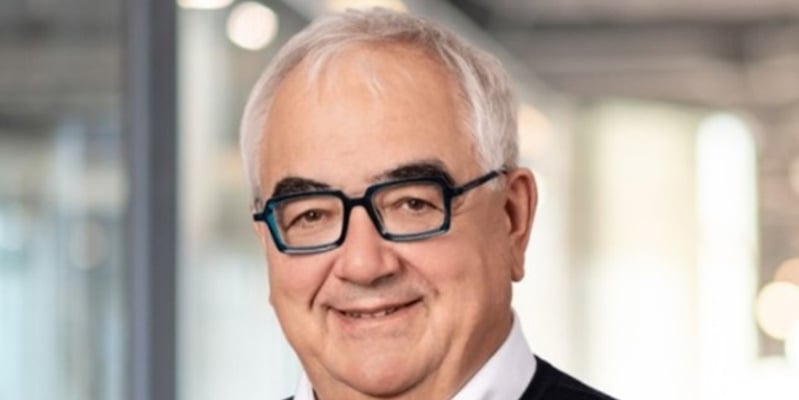Back home in Belgium after a stellar stint in Big Pharma, Dr Paul Stoffels is now looking to reshape the future of cancer care with the previously struggling biotech he helped co-found in 1999, Galapagos.
Stoffels is a heavyweight of the global pharmaceutical industry and close ally of the legendary Dr Paul Janssen, under whose tutelage he led the development of several breakthrough products for HIV, helping change the treatment paradigm for what was previously a life-ending disease. Having overseen a transformation of J&J’s R&D operations as its worldwide pharmaceuticals chairman, Stoffels was involved in the launch of 25 innovative medicines at the company – seven of which have since been added to the WHO’s Essential Medicines List – and doubled its pharma sales from USD 22.5 billion in 2009 to 45.6 billion by 2020. Immediately prior to rejoining Galapagos, he served as vice chairman of J&J’s executive committee and chief scientific officer, notable spearheading the development of its single-shot COVID-19 vaccine within a record time frame.
The complexities of conditions like cancer demand a revolutionary solution; that is where CAR-T cell therapy could be a potential game-changer
The challenges facing Stoffels upon leaving J&J and cutting short his retirement to return to Galapagos last year – ostensibly to be closer to his four children and seven grandchildren in Europe – were significant and differed greatly from those in a Big Pharma behemoth with a stacked pipeline like J&J. Following a string of poor data readouts and the shuttering of projects in osteoarthritis and pulmonary fibrosis, Galapagos’ own pipeline was almost bare, leading Stoffels to embark on what he called in the 2022 annual report, “a year of transformation and change.”
This meant moving away from the biotech’s historic R&D focus on novel mode-of-action small molecule drugs targeting a broad range of indications to what Stoffels calls “a patient-centric, medical need-driven approach in our key therapeutic areas of immunology and oncology.” Cell therapy was selected as the way forward, with Stoffels having been heavily involved in J&J’s 2017 licensing deal with Chinese drug developer Legend Biotech for what became Carvykti, still one of only two cell therapies approved in the US for multiple myeloma. “The complexities of conditions like cancer demand a revolutionary solution; that is where CAR-T cell therapy could be a potential game-changer,” he says.
However, drawing on his decades of experience, Stoffels is keen to foreground the fact that game-changing innovation means nothing if it cannot be absorbed by healthcare systems due to lack of funds or infrastructure. This is especially pertinent for CAR-T cell therapies, which often come at a cost of hundreds of thousands of dollars due to the need for complex cellular manufacturing as well as the high level of hospital care necessary post-administration.
He notes that “The true essence of a therapy lies not only in its effectiveness but also in its accessibility, flexibility, and the expansion of its benefits to encompass a broader spectrum of life-threatening diseases. That is where pioneering research and groundbreaking manufacturing solutions could play a significant role.” He adds, “Despite the tremendous potential of current CAR-T therapies, long lead times, highly manual central manufacturing, and complex logistics remain the limiting factors for large-scale capacity and broad patient access.”
In this spirit of pragmatism with the aim of making a rapid leap forward to develop solutions addressing CAR-T’s current limitations, Stoffels has looked towards M&A. In his first year on the job, Galapagos acquired two companies – Cellpoint and AboundBio – which he explains gave it access to both “an innovative, scalable, decentralized, and automated point-of-care CAR-T delivery model as well as a next-generation fully human antibody-based therapeutics platform.”
The true essence of a therapy lies not only in its effectiveness but also in its accessibility, flexibility, and the expansion of its benefits to encompass a broader spectrum of life-threatening diseases
Being able to administer and monitor CAR-T cells via a machine which sits at a patient’s bedside will, in Stoffels’ view, have important ramifications on the speed, quality, and cost of the therapy, allowing for administration with seven days and eliminating the need for complex logistics or cryopreservation. Galapagos will install its manufacturing capabilities in ten European hospitals in 2023 and up to 20 next year, when it will also launch in the US.
Additionally, while the integration of this new delivery model for CAR-T into healthcare systems will depend upon these systems “recognizing the value of innovation, implementing appropriate reimbursement practices, expediting regulatory processes, and ensuring timely market entry,” Stoffels is optimistic that another career-defining breakthrough is afoot.
“Whether we are developing therapies for conditions like HIV or pushing the boundaries of innovative science such as CAR-T, our ultimate goal is to translate scientific discoveries into tangible improvements in the quality of life for those in need,” he concludes. “Let us all work together with a shared vision, collaborating to transform scientific discoveries into meaningful healthcare solutions that enhance the lives of patients worldwide.”


